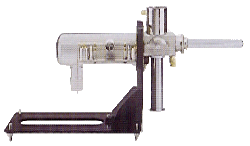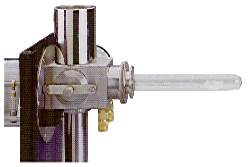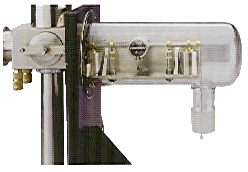Six different furnaces are available for independent or simultaneous TGA, DTA, or DSC measurements. The balance is usually built in a bench top design. The 1750°C and 2400°C designs are built on floor mount racks for added support. The advanced MS?Windows?software is designed for simple operation with comprehensive data analysis. System control and data collection is performed with the Linseis L70/2001 controller card inserted in a Personal Computer expansion slot. The multi-tasking software can collect data and analyze data simultaneously. |
 Picture 1. basic balance for horizontal and vertical measurments |
L81 basic balance for horizontal and vertical operationThe basic balance that is used for horizontal and vertical measurements can be seen in picture 1. The horizontal method is used for measurements from -150°C up to 1000°C. By design the horizontal balance beam is longer than the vertical, this increases the balance resolution. The advantage of this method is the one direction gas flow. The large sample holder increases the surface area of the sample which is exposed to the flowing gas. |
 Picture 2. horizontal measuring mode |
Vertical operation designThe advantage of measuring in the vertical design is higher final temperature. Also as the measuring system expands with increasing temperature vertically, it does not have any impact on the resulting mass signal. Also the DTA and DSC signal is easily adjusted for higher sensitivity and better signal/noise ratio. |
|
Technical Data for balance L81 Sample weight max.: horizontal 10g vertical 25g measuring ranges: horizontal 1 10 100 1000 mg vertical 2,5 25 250 2500 mg tare: electronically temperature drift: 0,01 mg/°C vacuum: 10-5 mbar max. |
 Picture 3. detailed view of the balance mechanism |
Balance Software |
Balance Applications
Information: info@linseis.com
Webmaster: BRT